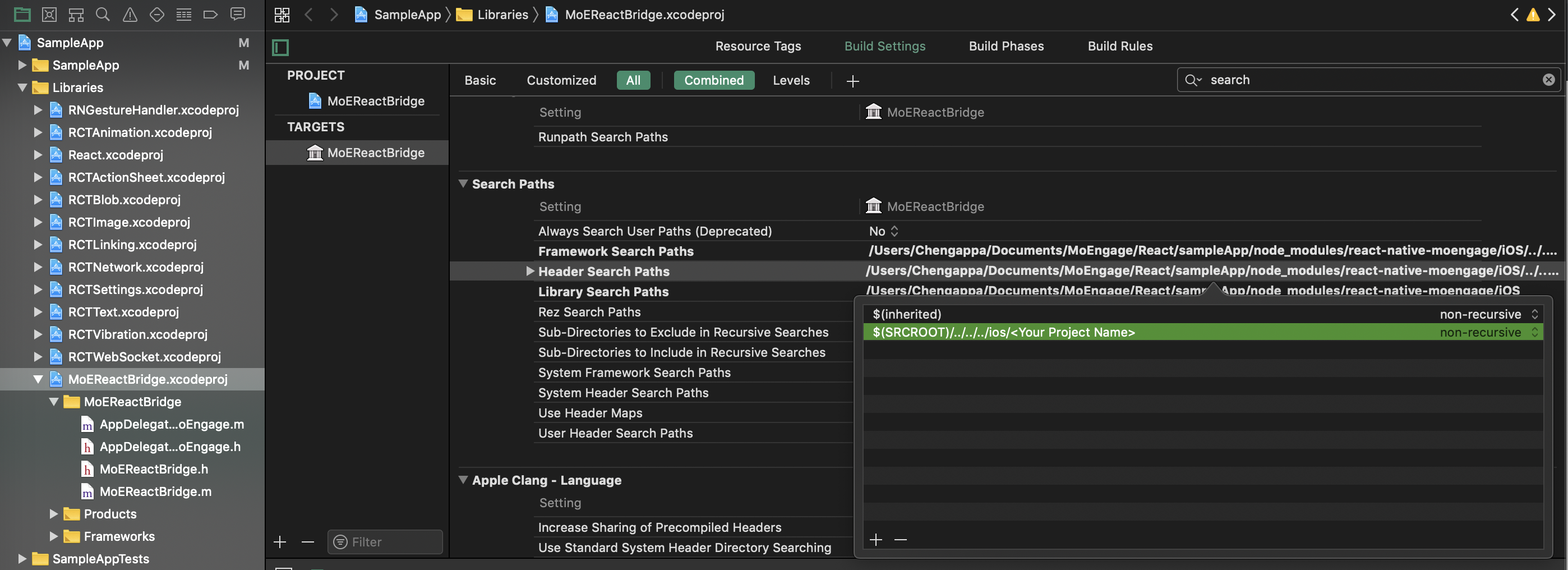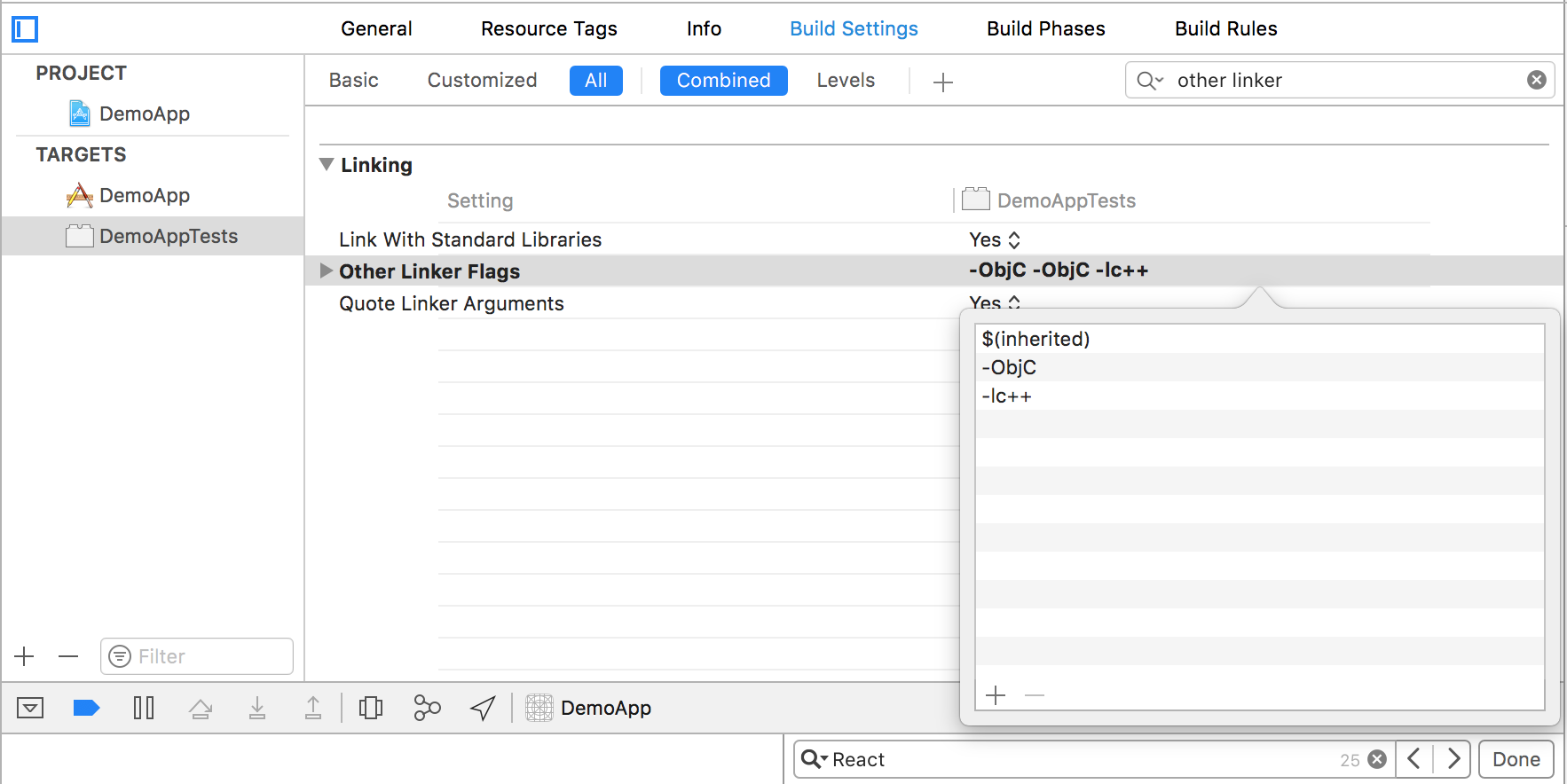SDK Installation
Install MoEngage's React Native plugin using the npm package manager. And then link your native dependencies :
$ npm install react-native-moengage
$ react-native link
After installing the plugin lets move on to platform-specific configuration.
Android
In android/settings.gradle add the following
include ':react-native-moengage'
project(':react-native-moengage').projectDir = new File(rootProject.projectDir, '../node_modules/react-native-moengage/android')
In android/app/build.gradle add the following
dependencies {
...
implementation project(':react-native-moengage')
implementation "com.moengage:moe-android-sdk:9.8.04"
}
Add the MoEngage React Package in the Application class's getPackages() Also enable auto integration in the onCreate()
public class MainApplication extends Application implements ReactApplication {
private final ReactNativeHost mReactNativeHost = new ReactNativeHost(this) {
@Override
protected boolean getUseDeveloperSupport() {
return BuildConfig.DEBUG;
}
@Override
protected List<ReactPackage> getPackages() {
return Arrays.<ReactPackage>asList(
new MainReactPackage(), new MoEReactPackage());
}
};
@Override public void onCreate() {
super.onCreate();
// this is the instance of the application class and "XXXXXXXXXXX" is the APP ID from the dashboard.
MoEngage moEngage =
new MoEngage.Builder(this, "XXXXXXXXXXX")
.build();
MoEInitializer.initialize(moEngage);
}
@Override
public ReactNativeHost getReactNativeHost() {
return mReactNativeHost;
}
}
In case you are facing issues with the import add the below import statement in your java file.
import com.moengage.react.MoEReactPackage;
import com.moengage.core.MoEngage;
iOS
NOTE:
The current
react-native-moengageplugin supportsMoEngage-iOS-SDKversion5.*.
CocoaPods Integration:
- CocoaPods Integration is supported from
react-native-moengageversion 4.0.0
If using CocoaPods integration for adding the dependency, then you just have to run pod install to add our react native plugin and MoEngage-iOS-SDK pods to iOS project. Post that add "${PODS_ROOT}/../<YourProjectName>" to the Header Search Path of ReactNativeMoEngage target in Pods project as shown below :

Post-install hook in pod file:
The above can also be achieved by having a post-install hook in your pod file as shown below:
target 'YourAppTarget' do
# list of pods
use_native_modules!
post_install do |installer|
installer.pods_project.targets.each do |target|
if target.name == "ReactNativeMoEngage"
puts "Updating #{target.name} HEADER_SEARCH_PATHS"
append_header_search_path(target, "${PODS_ROOT}/../<YourProjectName>")
end
end
end
end
# Method to append header search path to a target
def append_header_search_path(target, path)
target.build_configurations.each do |config|
xcconfig_path = config.base_configuration_reference.real_path
# to keep the delimiter at the end of each string:
file_data = File.read(xcconfig_path).split(/(?<=[\S])\n/)
# Copy current headers
header_search_paths = ""
header_search_paths_index = nil
file_data.select.with_index do |val, index|
if /HEADER_SEARCH_PATHS/ =~ val
header_search_paths = val
header_search_paths_index = index
end
end
# Append the new header
new_header_search_paths = header_search_paths << " #{path}"
file_data[header_search_paths_index] = new_header_search_paths
# Write it back to the file
file_data = file_data.join("\n")
File.write(xcconfig_path, file_data)
end
end
Libraries Integration:
In case if you are using the Libraries Integration, you will have to explicitly update pod file to install our native MoEngage iOS SDK. Add MoEngage-iOS-SDK to your podfile:
pod 'MoEngage-iOS-SDK','~> 5.0.0'
After installing the Pods, select the MoEReactBridge target in MoEReactBridge.xcodeproj and go to Header Search Paths section in Build Settings as shown below. Here update the search path $(SRCROOT)/../../../ios to include your Project's main directory which contains the AppDelegate file as shown below.

NOTE:
Updating the Header Search Path is important as the MoEngage React Native plugin needs access to the AppDelegate file of your project.
NOTE :
Incase if you get errors in the test targets of the project, go to build settings of the test target and add -lc++ flag to Other Linker Flags as shown below :

Thats it!! SDK is successfully installed in the project, and ready to use.
Updated almost 6 years ago
